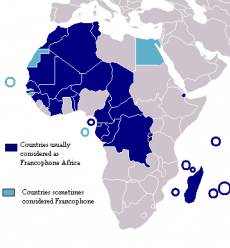
Email: nadege.preston@hotmail.com
Total Article : 82
About Me:Hi I’m Nadege and I study French at the University of Leeds, and I have just completed my third year abroad in Montpellier studying literature and enjoying the sunshine! I love art; painting and being creative, as well as photography and baking. Travelling is my favourite hobby at the moment; experiencing the French language and culture. I hope you enjoy reading some of my articles!

Africa has been characterised with high linguistic diversity since the colonial period. When Africa was colonised (North, West and Central Africa), the colonisation period had greatly affected the people, and had a huge impact on the culture, language and insitutions in Africa. It is necessary to understand the terms of ‘the coloniser and the colonised’. The coloniser is someone who has the aim to impose his own policies, language and culture onto the people of Africa in this case, whilst the colonised are the people who the coloniser has succeeded in establishing political control over.
Language in Africa is used as a political tool, and is highly important, more important than in other countries as it is used for development. As French is considered a modern language, the French language, which the colonisers wanted to impose onto the people of Africa, was used to modernise the country. There had been an evident struggle to create a national language in many countries, due to multilingualism, meaning that the high linguistic diversity caused countries to lack unity, as many people in one country spoke different languages.
When colonisers entered Africa, their aim was to impose their own language, culture and dominant role onto the colonised, which meant that the colonisers disregarded the culture and history of the African people. The colonised were forced to forget their past, and everything they knew, in order to establish the goals the colonisers had. Objectification occurred because of this, as the identities of the colonised were destroyed, and ‘erased’ by the coloniser. In fact, it could be said that the colonisers utilised their powers to rewrite history and to destroy the past of the colonised. There is therefore an evident link to slavery during the process of colonisation, because of the objectification which took place involving the colonisers mistreating the colonised and forcing them to give up their identity so that they conform to the rules of the coloniser. The colonisers were imposing the French language, religion and culture onto the colonised people who had no voice or say in the matter.
The link between slavery and colonialism is highlighted by Albert Memmi who is a French writer of Tunisian-Jewish origin. He states that “slavery was not abolished, it evolved into colonisation” which can be found in the introduction to his book on the ‘Coloniser and the Colonised’. Consequently, it is clear that colonialisation was a brutal process which did not respect the human rights of the people. The colonisers’ objectives were based on power, wealth and economic privilege which were achieved by reinforcing fear and submission upon the colonised people in order to change their culture for a ‘better’ one.
IMAGE URL
http://upload.wikimedia.org/wikipedia/commons/4/4f/Francophone_Africa.png

0 Comment:
Be the first one to comment on this article.